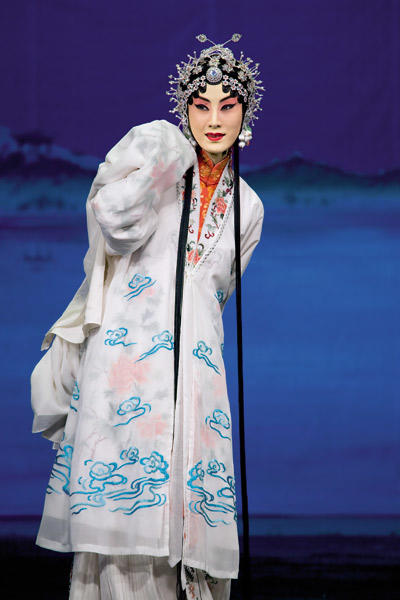Adaption of Peking Opera Classic Reinvigorate Tradition

Zhang makes her debut at the Lincoln Center for the Performing Arts in New York City in September that year by performing The Legend of the White Snake. [Photo provided to China Daily]
A decade in development, Peking Opera star Zhang Huoding's adaptation of the classic Farewell My Concubine in the Cheng style is nothing short of a dream come true, Chen Nan reports.
"One of my biggest dreams started more than 10 years ago, and now it's coming true," said Peking Opera star Zhang Huoding in a rehearsal room of the National Academy of Chinese Theatre Arts on April 23.
For the past year, she has been practicing and working on adapting the classic Peking Opera piece, Farewell My Concubine, from the same rehearsal room.
With the collaboration of 77-year-old Peking Opera artist Gao Mukun and 78-year-old composer Wan Ruixing, Zhang's rendition of Farewell My Concubine will premiere at the Chang'an Grand Theater in Beijing on May 25. In October, the show will be staged in Shanghai.
Telling the love story between Xiang Yu, a warlord of the Chu Kingdom, and his concubine, Yu Ji, the classic Peking Opera is one of the most famous pieces of the 200-year-old art form, which combines singing, dancing, martial arts and acrobatics.
Adapted from the Kunqu Opera piece, Qian Jin Ji, written by Ming Dynasty (1368-1644) writer Shen Cai, Farewell My Concubine was first performed by Peking Opera masters Yang Xiaolou (1878-1938) and Shang Xiaoyun (1900-1976) in Beijing in 1918.
In 1922, Peking Opera master Mei Lanfang (1894-1961), along with Yang, performed the piece, which later became one of the most famous works in Mei's repertoire. The piece is also regarded as one of the most classic pieces of the "Mei school", the performing style he developed.

Zhang Huoding (center) closes the Meet in Beijing Arts Festival with the Peking Opera piece Dream of the Boudoir in 2015.[Photo provided to China Daily]
Zhang was trained by Peking Opera master Zhao Rongchen and keeps up the traditions of the "Cheng school", a performing style founded by Cheng Yanqiu (1904-58)-one of the four major performing styles of Peking Opera that emerged in the early 20th century.
Like Mei, Cheng mastered the techniques of men playing female roles, known as nandan. The "Cheng school" is known for interpreting tragic female roles with frequent changes in rhythm.
"Farewell My Concubine is well-known for being performed in the style of Mei. Now, I am adapting it to the performing style of Cheng, which is very challenging. The two styles of tones, gestures and movements are very different. There have been many occasions over the past 10 years when I considered dropping the idea of adapting the piece entirely, but the notion just lingered in my mind," says Zhang.
Born in Baicheng, Northeast China's Jilin province, Zhang was introduced to traditional Chinese opera by her father, who was a performer of Pingju Opera, a traditional opera form popular in northern China. Her elder brother, Zhang Huoqian, began studying Peking Opera as a child. Zhang Huoding was trained to play qingyi-"graceful female roles".
Zhang Huoding fell in love with Farewell My Concubine after she was enrolled to study Peking Opera at an art school in Tianjin at the age of 15.
"The loyalty and love she felt for her man really touched me," says Zhang of the role, Yu Ji. When Xiang Yu realizes that he has lost his battle and is ready to spend his last night with Yu Ji, the concubine kills herself with Xiang Yu's sword to express her faithfulness.
In 1989, after graduating from the school in Tianjin, Zhang joined a military Peking Opera troupe in Beijing. From 1995 to 2008, she performed with the National Peking Opera Company. The 48-year-old now teaches at the National Academy of Chinese Theater Arts in Beijing.
In 2016, the academy launched a project that enabled Zhang to mentor young female Peking Opera students of the Cheng style.

Zhang Huoding, one of the country's best-known Peking Opera artists.[Photo provided to China Daily]
Zhang Huoding says when she wanted to adapt Farewell My Concubine about 10 years ago, she invited Peking Opera artist Gao, her former colleague from the National Peking Opera Company, to play the role of Xiang Yu.
"About a year ago, when I told him that the adaptation will finally come to fruition, Gao accepted the role at once. He kept his promise for 10 years," Zhang Huoding says.
"Since Farewell My Concubine is a very popular work for Peking Opera audiences, we keep to the original script and only make changes to the piece based on the Cheng performing style," says Wan the composer.
Wan, who started writing music in 1963, has worked with Zhang Huoding on many of her famous works, including the Peking Opera classic, The Legend of the White Snake, and the contemporary Peking Opera work, Jiang Jie.
One of the most famous parts of the piece is the sword dance, which was Mei's signature creation. This is the scene where Yu Ji dances with Xiang Yu's sword on their last night before she kills herself with it.
"The sword is an important element of the piece. Zhang Huoding choreographed the sword dance, which is as elaborate as it is creative," says Wan.
The Peking Opera piece, Farewell My Concubine by Zhang Huoding, will close this year's Meet in Beijing Arts Festival, the capital's largest annual celebration of dance, music, drama and art.
In 2015 and 2016, Zhang Huoding closed the festival with shows of The Jewelry Pouch and The Legend of the White Snake. In 2015, she also made her debut in the United States with performances at the Lincoln Center for the Performing Arts in New York.
